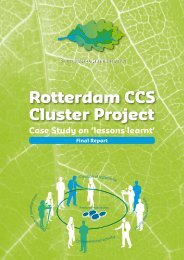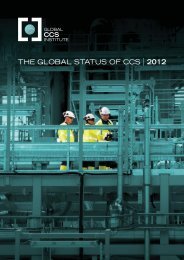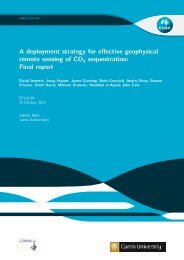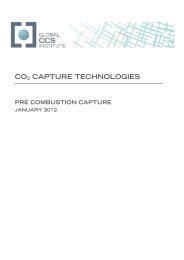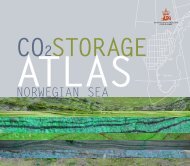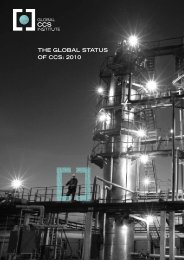Perceptions of CO2 Report - Global CCS Institute
Perceptions of CO2 Report - Global CCS Institute
Perceptions of CO2 Report - Global CCS Institute
- No tags were found...
You also want an ePaper? Increase the reach of your titles
YUMPU automatically turns print PDFs into web optimized ePapers that Google loves.
2 Literature review2.1 <strong>Perceptions</strong> and understandings <strong>of</strong> climate changeGiven the increasing international interest in climate change, multiple studies have been conductedto explore how climate change is perceived and understood (Berk & Schulman, 1995; Bord, Fisher,& O'Connor, 1998; Bostrom, Morgan, Fischh<strong>of</strong>f, & Read, 1994; Lorenzoni & Pidgeon, 2006;Patchen, 2010; Weber, 2010; Weber & Stern, 2011). Researchers focused on understandingperceptions <strong>of</strong> the range <strong>of</strong> low carbon energy solutions have also tended to investigate attitudestowards climate change. This is because early research has found that when reducing carbonemissions is seen as unnecessary, support for investment in low carbon energy options rapidlywanes (Ashworth, Carr-Cornish, Boughen, & Thambimuthu, 2009; Bradbury, et al., 2009;Shackley, Gough, & McLachlan, 2005).Results <strong>of</strong> research on public perceptions and understanding <strong>of</strong> climate change vary and areusually highly dependent on context. For example, timing <strong>of</strong> the investigation, particularly withrespect to a country’s current weather patterns and current political approach to climate change,typically influences how individuals respond to certain questions on their beliefs and experiences <strong>of</strong>a changing climate (Ashworth, Jeanneret, Gardner, & Shaw, 2011; Reser, et al., 2011). Even theframing <strong>of</strong> questions will influence how participants choose to respond (Reser, et al., 2011).Although general awareness <strong>of</strong> climate change has increased over the past two decades,individuals’ understandings <strong>of</strong> the topic remain incomplete (Read, Bostrom, Morgan, Fischh<strong>of</strong>f, &Smuts, 1994; Reynolds, Bostrom, Read, & Morgan, 2010). Despite increased popular mediaattention and some government policy focus on climate change and global warming, members <strong>of</strong>the general public still tend to conflate ozone layer depletion and global warming issues, anddisplay uncertainty about the relationship between anthropogenic global warming and risingatmospheric CO 2 levels (Reynolds, et al., 2010; Stamm, Clark, & Eblacas, 2000; Whitmarsh,Seyfang, & O'Neill, 2011). Some would argue that belief in climate change has actually declined.This is particularly evident in polls that were conducted around the time <strong>of</strong> ‘Climategate’ in 2009,when internal communications between climate scientists became public and appeared todemonstrate that the scientists were conspiring to present a stronger case for climate change thanwas actually substantiated (Paukovic et al., 2011). During this time, the integrity <strong>of</strong>Intergovernmental Panel on Climate Change (IPCC) research findings in the 4 th Assessment<strong>Report</strong> was questioned (Leiserowitz, Maibach, Roser-Renouf, Smith, & Dawson, in press).Our research team has previously found that while most Australians believe that the climate ischanging, a small proportion <strong>of</strong> the general public are either unsure (15%) or remain sceptical (7%)about climate change and its causes (Ashworth, et al., 2011b). Similarly, the majority <strong>of</strong> the generalpublic in Japan are convinced that climate change is happening, while about 10 percent remains tosome extent sceptical (Mizuho Information & Research <strong>Institute</strong> 2010). In the Netherlands, themajority <strong>of</strong> the general public still believed in 2010 that temperatures will increase in the future, butthis number has decreased significantly in the last years, which coincides with the timing <strong>of</strong>Climategate (Paukovic et al., 2011). The data in this study was not suitable to prove a causalrelationship though. Only a very slight majority <strong>of</strong> people believe that anthropogenic emissions leadto global warming.Understanding how individuals perceive carbon dioxide | 3




